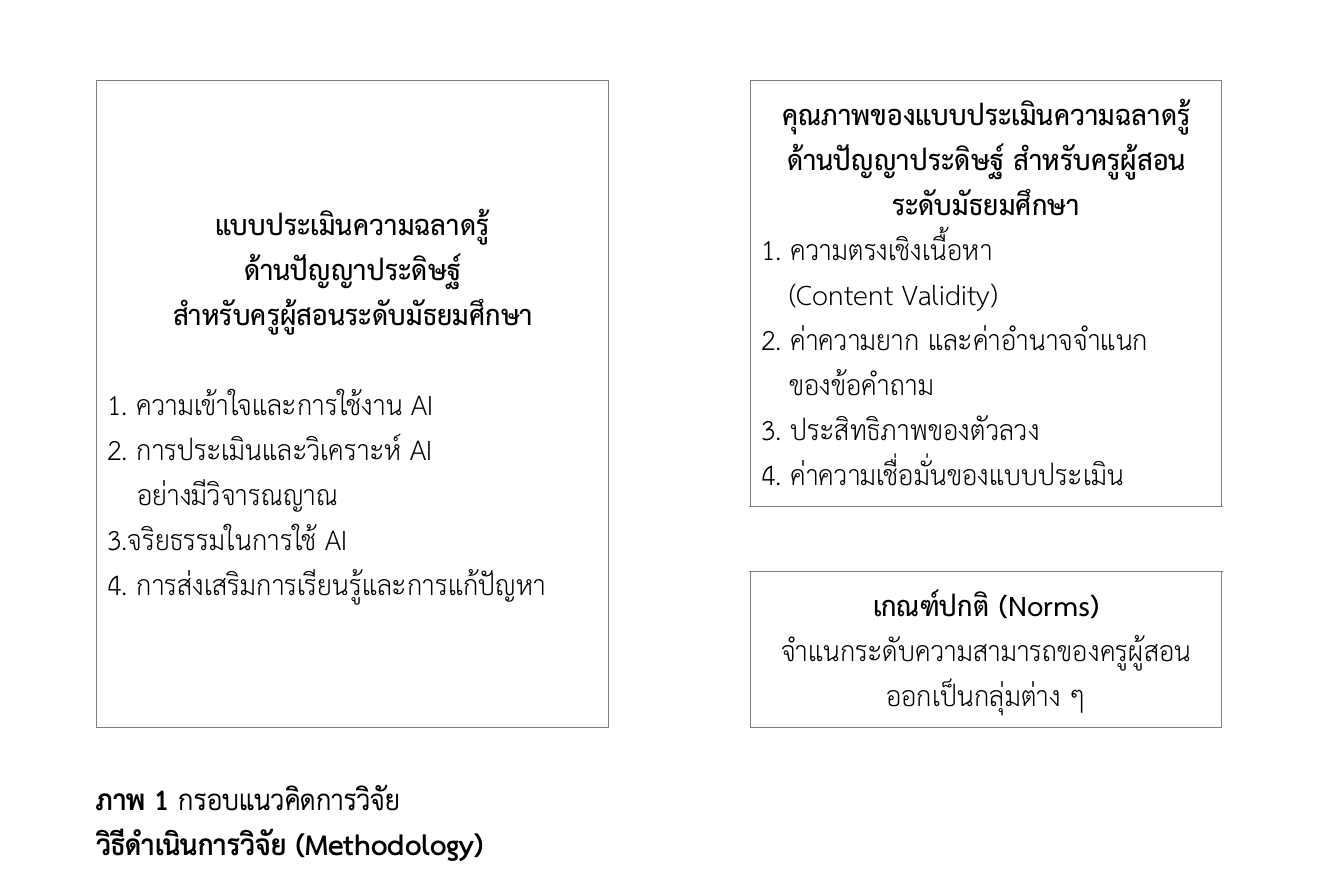การพัฒนาแบบประเมินความฉลาดรู้ด้านปัญญาประดิษฐ์สำหรับครูผู้สอนระดับมัธยมศึกษา
Main Article Content
บทคัดย่อ
การวิจัยครั้งนี้มีวัตถุประสงค์เพื่อ 1) สร้างและตรวจสอบคุณภาพของแบบประเมินความฉลาดรู้ด้านปัญญาประดิษฐ์ (AI Literacy) สำหรับครูผู้สอนระดับมัธยมศึกษา และ 2) สร้างเกณฑ์ปกติ (Norms) ของแบบประเมินดังกล่าว กลุ่มตัวอย่างคือข้าราชการครูระดับการศึกษาขั้นพื้นฐาน สังกัดสำนักงานเขตพื้นที่การศึกษามัธยมศึกษาปทุมธานี ปีการศึกษา 2567 จำนวน 241 คน ได้จากการสุ่มแบบหลายขั้นตอน เครื่องมือที่ใช้คือแบบประเมิน AI Literacy ข้อคำถามเป็นแบบปรนัย 4 ตัวเลือก จำนวน 40 ข้อ ครอบคลุม 4 องค์ประกอบ ได้แก่ (1) ความเข้าใจและการใช้งาน AI (2) การประเมินและวิเคราะห์ AI อย่างมีวิจารณญาณ (3) จริยธรรมในการใช้ AI และ (4) การส่งเสริมการเรียนรู้และการแก้ปัญหาด้วย AI ผลการวิจัยพบว่า แบบประเมินมีค่าดัชนีความสอดคล้องของข้อคำถาม (IOC) อยู่ระหว่าง 0.60 – 1.00 ค่าความยาก (P-value) อยู่ระหว่าง 0.23 – 0.76 ค่าอำนาจจำแนก (r) อยู่ระหว่าง 0.31 – 0.67 ค่าความเชื่อมั่น (Reliability) ของ Cronbach’s Alpha เท่ากับ 0.877 และการกำหนดเกณฑ์ปกติ (Norms) โดยใช้ Z-score และ T-score ทำให้สามารถจำแนกระดับ AI Literacy ของครูผู้สอนได้เป็น 5 ระดับ ได้แก่ สูงมาก (22.4%) ค่อนข้างสูง (35.2%) ปานกลาง (28.6%) ค่อนข้างต่ำ (9.8%) และต่ำ (4.0%)
Downloads
Article Details

อนุญาตภายใต้เงื่อนไข Creative Commons Attribution-NonCommercial-NoDerivatives 4.0 International License.
The authors are solely accountable for the ideas and recommendations articulated in the articles published in The LEAD Journal RU. Should there be any inaccuracies, the authors accept full responsibility for such errors.
Moreover, the Editorial Board, Editorial Team, and Committee of The LEAD Journal RU are committed to maintaining the integrity of the principles reflected in the authors' contributions.
Consequently, Ramkhamhaeng University, the Editorial Board, Editorial Team, and Editors shall not be held liable for any outcomes arising from the authors' presentation of their ideas and recommendations within The LEAD Journal RU.
เอกสารอ้างอิง
Ayanwale, M. A., Adelana, O. P., ... and Ishola, A. M. (2024). Examining Artificial Intelligence Literacy among Pre-service Teachers for Future Classrooms. Computers and Education Open, 6, 100179. https://doi.org/10.1016/j.caeo.2024.100179
Bastani, M. (2024). The Risks and Rewards of Generative AI in Learning Environments. Journal of Artificial Intelligence and Learning, 32(2), 112-128.
Bower, M. (2024). Redefining Education Assessment in the AI Era: Challenges and Strategies for Teachers. Educational Research and Innovation, 29(1), 78-95.
Casal-Otero, L., Catala, A., … and Barro, S. (2023). AI literacy in K-12: A Systematic Literature Review. International Journal of STEM Education, 10, 29. https://doi.org/10.1186/s40594-023-00418-7
Chhatwal, R. (2023). AI’s Role in Personalized Education and Student Engagement. International Journal of AI in Education, 40(1), 22-39.
Comrey, A. L. and Lee, H. B. (1992). A First Course in Factor Analysis (2nd ed.). New York: Lawrence Erlbaum Associates.
Ding, C. (2024). AI-powered Learning Analytics: Implications for Curriculum Development and Student Engagement. Computers & Education, 186, 104551.
Ding, L., Kim, S. and Allday, R. A. (2024). Development of an AI Literacy Assessment for Non-Technical Individuals: What do Teachers Know?. Contemporary Educational Technology, 16(3), ep512. https://doi.org/10.30935/cedtech/14619
Farrelly, T. (2023). Generative AI in Content Creation: Ethics, Applications, and Future Directions. AI & Society, 38(2), 287-309.
Han, A., Zhou, X., …. and Peppler, K. (2024). Teachers, Parents, and Students' Perspectives on Integrating Generative AI into Elementary Literacy Education. CHI Conference on Human Factors in Computing Systems. https://doi.org/10.1145/3613904.3642438
Jaikaew, P. (2022). Needs Assessment Model for the Use of Artificial Intelligence in International Standard Secondary School Administration. (Master Thesis, Nakhon Sawan Rajabhat University). [In Thai].
Jauhiainen, H. (2023). Generative AI and Its Impact on Educational Institutions. Scandinavian Journal of Education, 28(4), 55-73.
Kaldaras, L., Akaeze, H. O. and Reckase, M. D. (2024). Developing Valid Assessments in the Era of Generative Artificial Intelligence. Frontiers in Education, 9, 1399377. https://doi.org/10.3389/feduc.2024.1399377
Laupichler, H. (2023). The Impact of AI-assisted Learning on Student Motivation and Achievement. Learning and Instruction, 79, 101648.
Long, D. and Magerko, B. (2020). What is AI literacy? Competencies and Design Considerations. CHI Conference on Human Factors in Computing Systems, 598. https://doi.org/10.1145/3313831.3376727
Ministry of Higher Education, Science, Research and Innovation. (2022). National Artificial Intelligence Action Plan for Thailand (2022–2027). Bangkok: Cabinet of Thailand. [In Thai].
Ministry of Digital Economy and Society. (2022). National Artificial Intelligence Action Plan for Thailand (2022–2027). Bangkok: Cabinet of Thailand. [In Thai].
Ng, D. T. K., Leung, J. K. L., …and Qiao, M. S. (2021). Conceptualizing AI literacy: An Exploratory Review. Computers and Education: Artificial Intelligence, 2, 100041. https://doi.org/10.1016/j.caeai.2021.100041
Pathum Thani Secondary Educational Service Area Office. (2024). Basic Education Teacher Statistics under the Jurisdiction of Pathum Thani Secondary Educational Service Area Office, Academic Year 2024. Pathum Thani: Pathum Thani Secondary Educational Service Area Office. [In Thai].
Phimpho, P. and Lincharoen, A. (2024). A Development of Mathematical Literacy Test for Grade 10 students. Journal of MCU Ubon Review, 9(2), 1300–1301. [In Thai].
Prongprommarat, J., Hongkhuntod, A. and Talasi, W. (2021). The Development of Sexual Literacy Scale and Norm of Secondary School Students. Sikkha Journal of Education, 8(2), 23–24. [In Thai].
Relmasira, P. (2023). Teachers' AI Literacy and Its Impact on Instructional Design and Student Learning Outcomes. Technology, Pedagogy and Education, 32(2), 145-161.
Sanamnoi, P., Srihaset, K. and Tippayakulpairoj, D. (2023). A Construction of Information Literacy Skills Scale for Mathayomsuksa Three Students. Interdisciplinary Academic and Research Journal, 3(1), 543–552. [In Thai].
Tenberga, I. and Daniela, L. (2024). Artificial Intelligence Literacy Competencies for Teachers through Self-assessment Tools. Sustainability, 16(10386). https://doi.org/10.3390/su162310386
Wang, L. (2023). Assessing AI literacy: A multidimensional approach. Journal of Educational Research & Innovation, 29(1), 102-127.
Wongwanich, S. (2015). Research and Statistical Data Analysis with SPSS and AMOS. Bangkok: Chulalongkorn University Press. [In Thai].
Winter, M. (2023). ChatGPT and the Future of Education: A Critical Analysis of AI-driven Assessment Methods. AI & Education, 31(4), 512-528.


